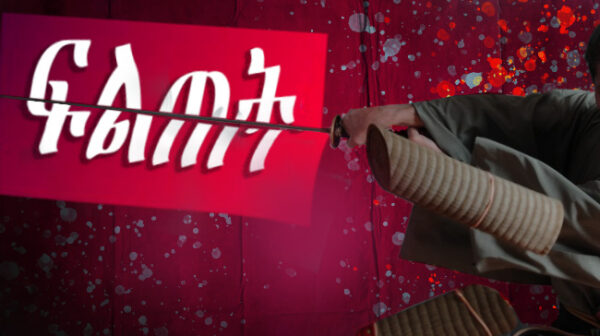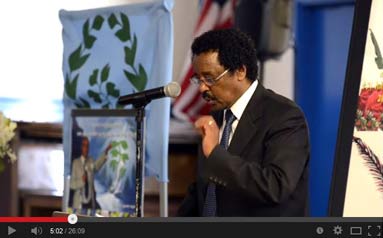The “Sacred Cows”

Nationalism pushed to its extreme equals ultra-nationalism of the fascist kind*. Ethnic pride pushed to its extreme leads to a narrowly defined ethnocentrism or even worse. Religious beliefs pushed to the extreme leads to fanaticism of the Boko Haram, ISIS, Al Shabab and of Myanmar’s genocide (on minority Rohingia) kind. Regionalism pushed to the extreme leads to narrowly defined sub-nationalistic tendencies. In today’s article, attempts will be made to address these volatile issues that are increasingly, to the chagrin of this writer, becoming a staple in the diasporic Eritrean social media, albeit minus the actual violence for obvious reasons. Every conceivable venue must be used to counter these disparaging tendencies. Eritrea, the bastion of diverse communities living side by side, is the last country that needs some such dangerous tensions. Allow me to start out with a subject matter far removed from Eritrea, religion-wise, but will provide a useful illustration, namely, the sacred cow in Hinduism.
One of the must-read textbooks for Anthropology students in universities, at least when I was an undergrad student, seemingly eons ago now, was the work of Marvin Harris (1927 – 2001). The beauty to the intellectual tradition of this country is that some scholars are able to cross that barrier from the Ivory Tower to the public sphere where their work becomes accessible to the laymen and laywomen. Harris was one of those whose intellectual gravitas I enjoyed thoroughly. Rather than focusing on “thick descriptions” (Geertz, 1973), Harris modeled his anthropological work by borrowing concepts from cultural materialism and population demographics. He was able to marry the two concepts into culture & ecology. His seminal work in this regard for the purposes of this article is the “Sacred Cows” essay that challenged the West on why Hindus’ inconceivability of slaughtering their surplus cows was not irrational even when starvation was widespread in India in 1968. The inconceivability of slaughtering the cows in the name of religion the West felt was proof enough that religious practices of Hinduism was irrational. But, Harris’s tenaciously thick analysis provides the below the surface that underlay to such belief system.**
The essential message that one should be cognizant of is to NOT be judgmental of others’ beliefs. Any belief has its own surface and beneath the surface level internal logic, as such, it is best left to its adherents’ devise so long it does no harm to others who may or may not be believers. So, when priests and sheiks cross their theological lines and use history, political science, medical procedures to explain away and justify Providence’s greatness, especially, when they have no training in these fields is when the message they send becomes dangerously irresponsible. Eritreans need to learn on what it is they can speak with authority. This is not to suggest that one shouldn’t have an opinion, of course, one should. But, one also should be open to learning from others who speak from a place of expertise. All that one needs to put into consideration is that every brick ought to not act like it is the whole wall. A brick is part of the wall but not what exclusively makes the wall. That one brick needs to live in harmony, with all modesty that such coexistence invokes in knowing where it is placed on the wall where it is contributing to the wall to be erected upright. This needs to be emphasized, lest someone surmise from this that one cannot move from one field of endeavor to another. Of course, one could, but one needs to have the needed interdisciplinary knowledge to make that transformation. Therefore, if one’s training is in theology, then, please cling to it and don’t try to somehow feel entitled to be an authority in other fields of endeavors. The reverse is also true. When politicians begin to use their political office to advocate for something they have no sufficient knowledge of, resorting to their personal beliefs to justify issues, is when they make colossal mistakes
The corollaries to the above mix-ups are nothing more than misdirected anger, outright rejection of the Other’s idea as ill-conceived and laced with xenophobia. Such ignorance quickly turns to a wholesale intense loathing toward certain belief system, akin to a show of the grotesque, so grotesque, in fact, one is hard-pressed to even sit through some of these clips to watch in their entirety. Fleetingly, they appear and disappear through social media. However, they not only raise the temperature of the targeted groups but also, they leave their indelible mark on our collective psyche. Cumulative effects of these kinds of unwise and detrimental remarks leave many to wonder whether the idea of the nation-state of Eritrea and its viability is going to weather these endless social and political storms. Whether Eritrea is going to be a failed state after the menace expires of old age or is deposed like countless men at the helm of political power who ruled with an iron-fist across the world, before him.
Not so fast! The sky has not fallen on us yet is a visceral response that injects itself on someone who wants to cling onto a hope and to that flickering light at the end of the tunnel. We can still get it right appears to be the little voice that whispers in one’s ears.
Nonetheless, this vicious cycle can only be made to stop if we collectively begin to think with cool heads. It is in the nature of optics for some of the highly charged video clips that we are subjected to watch to generate overreaction on all corners. The nature of social media is such that it requires swift responses. But, some optics need not be reacted to, nor should they be popularized by overreaction. What these overreactions are doing is allowing us to be distracted from the task at hand. Each and every time someone comes up with an outrageous statement, or a little play produced in the prayer halls, a place that was supposed to be of spiritual renewal and sustenance. How we treat such productions matters the most. If we keep on sharing some such nausea-inducing messages, what we are doing is inadvertently popularizing it. The best thing to these kinds of clips is to bury them by overwhelming other constructive messages.
I still believe that the sky has not fallen yet. Here is what’s meant by constructive messages:
Two major Eritrean national holidays are descending upon us in the next three months, the first one of which is May 24th. This is not my idea, but a dear friend who is trying to locally institute this, my take, however, is that it should be applied globally. Think of the entire month of last November where Eritreans came out in droves from North America to Europe, to Australia, to the Middle East and Africa by standing shoulder-to-shoulder with Aboy Musa and the Akhriya uprising, because Eritreans in diaspora understood it was, indeed, Eritrea’s uprising against tyranny. How about Eritreans the world over selecting the weekend following the said date to celebrate in unison, male, female, Muslims and Christians, Eritreans from all walks of life own Independence Day, because it is the day in which Eritrea became a de facto nation and two years later with overwhelming support of the population of Eritrea it became a nation de jure. That fate of nation-state was sealed. Of course, each community can decide how to celebrate the day, but what matters is that Eritreans show solidarity and own that day.
Similar solemn memorialization can be done on June 20th. Now, this kind of solidarity will send a clear message to the menace at home, a menace that thrives in the colonial master/slave narrative of yesteryears. Oh, by the way, it so happened May 24th will fall on the month of Ramadan. That would be a perfect opportunity for Muslim Eritreans to invite their Christian brothers and sisters to join them in their Iftars (when they break their fast) as a way of celebrating May 24th. It’s to be recalled Ramadan and Eid were a month in which Eritrean Christians and Muslims have fond memories of, because it was a month in which sharing food, giving alms to the poor was invariably instituted by individuals and families toward their neighbors. Of course, in the diaspora, this will have a different tone to it. People will not come to break the fast because they don’t have food but will come because they have a common heritage, part of that common heritage happens to be May 24th and ought to celebrate together.
There is nothing more an irritant and something that the regime fears and detests the most than seeing Eritreans gathering across religious and across ethnic lines because creating a wedge has been the way it throve up-to this day. Using the divide and conquer rule from the old playbook, little by little, the country has been emptied and is on the verge of disintegration, because young men and young women couldn’t live under such conditions. They are opting to leave the country risking their livelihood.
When one’s population chooses to risk of vanishing in the high deserts of the Bedouin monsters; when the young choose to risk of becoming victims of the vicious ISIS and Al Qaeda riffraff of human beings; when the young choose to risk of vanishing in the high seas of the Mediterranean. There is no clearer message than this that the tyrant at home must be fought tooth and nail by those of us who are not directly impacted by its merciless wrath, a wrath that does not even discriminate between nine-year-olds and ninety-year-olds. The latest low has been where both categories have been made to disappear in the dungeons within Eritrea. The least we can do is have some sense of knowing what our priorities are. Blaming one religion versus another is not where it’s at. Where it’s at is with those who are the source of major problems that Eritreans are facing: handful bastards changing Eritrea for something it is not. So, this is a call to action for the cool heads to prevail.
Khaled Abdu’s Cool-Headed World
A cool-headed speaker on weekend that ended the month of March 2018, changed the downward spiral to a hopeful and encouraging note. My hope is that we continue on that trajectory for the rest of the year and beyond. It was so relieving to listen to Khaled Abdu’s speech. He captured it all, spirit and soul. The ever-fractured gatherings on so many various lines, he respectfully challenged his audience like nobody else has done before. The core of the message appeared to be to not belittle the contribution of the likes of Abona AbdulQadir Kebire and Abona Musa’s nationalist message. Khaled Abdu saved me from myself, made me believe there is light at the end of the tunnel, because he just didn’t shy away from what ails us, he confronted it head on. See the video link and I guarantee you, you will not be disappointed. Rare are those who teach and entertain simultaneously.
What this young man addresses needs to be heard and listened to attentively. Giving description and analysis of it here will not suffice. Suffice it, however, to mention that his sense of humor, his topical subject matter, his flawless skills of Tigrinya language, his analytical abilities, all and all, gives the much-needed hope that was otherwise beginning to be lost in the clutter of the social media, one that is poorly conceived optics-doctoring. Nobody would deny that there will be disagreements, but these disagreements will only make us better and sharper in the way we handle our national affairs. I watched Khaled Abdu’s piece at the behest of a friend who insisted that I would be pleased, because he knew these are the topics a handful of us talk about incessantly, but Khaled Abdu captured it as if he was with us discussing these issues for several years now. Listen to it on this link.
* After writing the article above a week ago now, but I felt there was something amiss in it. Thus, I couldn’t bring myself to having it published. I kept on asking for its delay to Awate editor. When I heard an interview of Madeleine Albright on her new book two days ago that warns of the ominous signs she sees in the rise of fascism. That was exactly what I felt this piece was missing, the ominous signs of the dangers of fascism coming in different disguise, including in our part of the world. At any rate, this is a woman whose family fled the dangers of fascism when she was a girl. And, she rose through the ranks and became an expert of diplomacy, and she has the knowledge and the experience to show for it. After all, she was the first woman Secretary of State of the most powerful nation on earth. I urge y’all to listen to the interview. I have yet to read her book, but certainly, all should listen to the interview here.
**Here is how Harris justified why the sacred cow continues to stay sacred in India:
“…the system operates with such high efficiency that the children of West Bengal recover nearly 100 percent of the dung produced by their livestock. From 40 to 70 percent of all manure produced by Indian cattle is used as fuel for cooking; the rest is returned to the fields as fertilizer. Dried dung burns slowly, cleanly, and with low heat – characteristics that satisfy the household needs of Indian women. Staples like curry and rice can simmer for hours. While the meal slowly cooks over an unattended fire, the women of the household can do other chores. Cow chips, unlike firewood, do not scorch as they burn. It is estimated that the dung used for cooking fuel provides the energy-equivalent of 43 million tons of coal. At current prices, it would cost India an extra 1.5 billion dollars in foreign exchange to replace the dung with coal. And if the 350 million tons of manure that are being used as fertilizer were replaced with commercial fertilizers, the expense would be even greater. Roger Revelle of the University of California at San Diego has calculated that 89 percent of the energy used in Indian agriculture (the equivalent of about 140 million tons of coal) is provided by local sources. Even if foreign loans were to provide the money, the capital outlay necessary to replace the Indian cow with tractors and fertilizers for the fields, coal for the fires, and transportation for the family would probably warp international financial institutions for years…” (Harris, “Sacred Cows”, p. 205).



Awate Forum